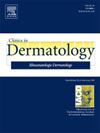Part I: Health issues of those experiencing trafficking: Background and context for dermatologists
IF 2.3
4区 医学
Q2 DERMATOLOGY
引用次数: 0
Abstract
Human trafficking is a global human rights violation affecting millions of individuals across diverse demographic characteristics with severe health consequences. Despite the frequent interactions that exploited individuals have with health care systems, many remain unrecognized, positioning health care providers, including dermatologists, as critical first responders. In the first part of this three-paper series, we discuss the current landscape of human trafficking from a health care perspective, emphasizing the role of dermatologists in recognizing and responding to this issue. This paper reviews the current understanding of trafficking, outlines the epidemiology and legal framework surrounding it, and discusses gaps in training for health care providers and policy that may hinder effective identification and intervention. It also explores state and national efforts to incorporate human trafficking education into health care training, emphasizing the need for standardized, trauma-informed approaches within dermatology. By fostering awareness and advocacy within the dermatology community, this paper aims to contribute to the broader efforts to combat human trafficking and improve the care and support provided to this patient population.
第一部分 - 人口贩运受害者的健康问题:皮肤科医生的背景和环境。
人口贩运是一种全球性的侵犯人权行为,影响着不同人群中的数百万人,对他们的健康造成了严重后果。尽管被剥削者与医疗保健系统的互动频繁,但许多人仍未被发现,这使得包括皮肤科医生在内的医疗保健提供者成为关键的第一响应者。在这三篇系列论文的第一部分中,我们从医疗保健的角度讨论了人口贩运的现状,强调了皮肤科医生在识别和应对这一问题中的作用。本文回顾了当前对人口贩运的理解,概述了流行病学和与人口贩运相关的法律框架,并讨论了医疗服务提供者培训和政策方面的差距,这些差距可能会阻碍有效识别和干预。本文还探讨了各州和国家在将人口贩运教育纳入医疗培训方面所做的努力,强调了在皮肤科中采用标准化、创伤知情方法的必要性。本文旨在通过提高皮肤病学界的认识和宣传,为打击人口贩运、改善对这一患者群体的护理和支持做出更广泛的贡献。
本文章由计算机程序翻译,如有差异,请以英文原文为准。
求助全文
约1分钟内获得全文
求助全文
来源期刊

Clinics in dermatology
医学-皮肤病学
CiteScore
4.60
自引率
7.40%
发文量
106
审稿时长
3 days
期刊介绍:
Clinics in Dermatology brings you the most practical and comprehensive information on the treatment and care of skin disorders. Each issue features a Guest Editor and is devoted to a single timely topic relating to clinical dermatology.
Clinics in Dermatology provides information that is...
• Clinically oriented -- from evaluation to treatment, Clinics in Dermatology covers what is most relevant to you in your practice.
• Authoritative -- world-renowned experts in the field assure the high-quality and currency of each issue by reporting on their areas of expertise.
• Well-illustrated -- each issue is complete with photos, drawings and diagrams to illustrate points and demonstrate techniques.
 求助内容:
求助内容: 应助结果提醒方式:
应助结果提醒方式:


